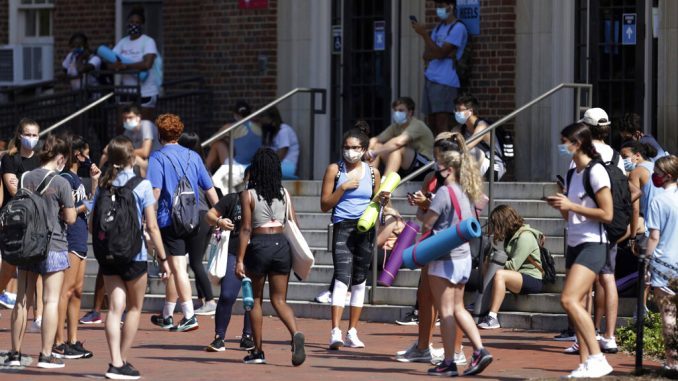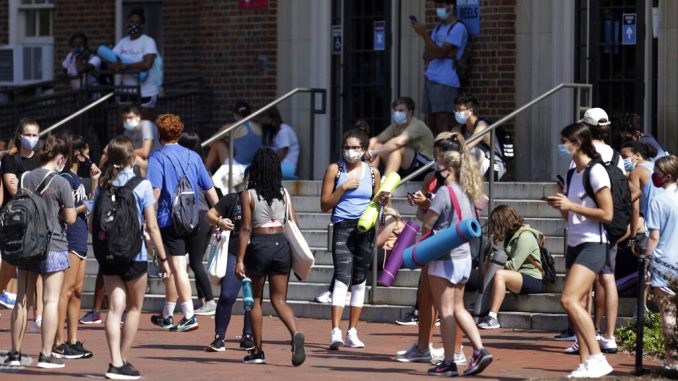

A major North Carolina university canceled in-person classes for undergraduates just a week into the fall semester as the school and other campuses around the U.S. scrambled to deal with coronavirus clusters linked in some cases to student housing, off-campus parties and packed bars.
The University of North Carolina at Chapel Hill said it will switch to remote learning on Wednesday and make arrangements for students who want to leave campus housing.
“We have emphasized that if we were faced with the need to change plans — take an off-ramp — we would not hesitate to do so, but we have not taken this decision lightly,” it said in a statement after reporting 130 confirmed infections among students and five among employees over the past week.
UNC-CH said the clusters were discovered in dorms, a fraternity house and other student housing.
Before the decision came down, the student newspaper, The Daily Tar Heel, ran an editorial headlined, “UNC has a clusterf—k on its hands,” though without the dashes.
The paper said that the parties that took place over the weekend were no surprise and that administrators should have begun the semester with online-only instruction at the university, which has 19,000 undergraduates.
University of North Carolina System president Peter Hans said, “The decision to adapt operations applies to UNC-Chapel Hill only, because no other UNC System institution has reported information, at this time, that would lead to similar modifications,” earlier this week.
“All students must continue to wear facial coverings and practice social distancing as part of their personal responsibility, particularly in off-campus settings. Taking personal responsibility and enforcing community standards are essential for the success of this semester and for protecting public health,” Hans said.
Outbreaks earlier this summer at fraternities in Washington state, California and Mississippi provided a glimpse of the challenges school officials face in keeping the virus from spreading on campuses where young people eat, live, study — and party — in close quarters.
UNC Board of Governors member Marty Kotis wrote on Facebook Monday evening about the decision, saying, “I didn’t have a say or vote on the UNC-CH switch to remote instruction. But as a member of the UNC System BOG, I was vehemently opposed to allowing the schools to charge the same fees as in-person, same tuition, room and board, etc.”
In an interview Tuesday with North State Journal, Kotis said one of the most frustrating aspects of the decision is the data simply isn’t available to make such a consequential decision.
“If students want to withdraw they should get their money back, and if their classes are online and they don’t get the experience of the class, they should be able to pay a reduced price,” said Kotis.
“30,000 students didn’t show up COVID free. What is an acceptable positive rate? Is it really safer doing classes off campus and at Starbucks vs. on campus where the school controls everything?” Kotis said, noting that each campus has developed procedures included mandates for face coverings, social distancing, and more.
Kotis also said there is a massive assumption that online classes equals better for students, but there’s no data behind that feeling, not to mention that now with students off campus, there are no university controls for what students are doing and that responsibility now falls to the local areas.
“Without good data, its hard to make an informed decision. We may see this as a test case comparing (UNC) Chapel Hill with another university staying on campus and seeing the results,” Kotis added.
Another aspect of the sudden end to classes is the university employees, who now face the prospect of furloughs or layoffs. Kotis said those employees now may be forced to work in less safe environments than the university system.
NSJ also reached out to Gov. Roy Cooper’s office for comment on the university’s decision to move to remote learning. Catie Armstrong from Gov. Cooper’s office said, “All colleges and universities should be requiring students and staff to wear cloth masks that cover the mouth and nose, and limiting social gatherings to 10 people indoors and 25 outdoors. Because COVID-19 is highly contagious, communal living such as dorms makes it challenging to control virus outbreaks. Reducing the number of students living in communal dorms can help prevent spread of the virus. We will continue engaging with the higher education community as they learn from the experiences at UNC-Chapel Hill and work to protect their campuses and surrounding communities.
The Associated Press contributed to this story.



